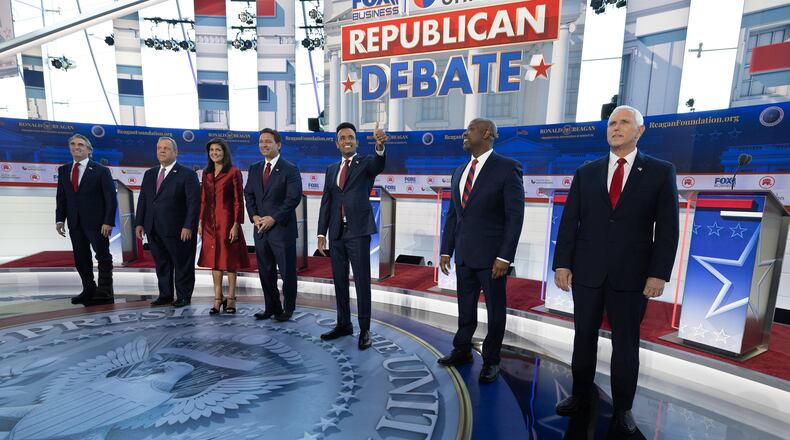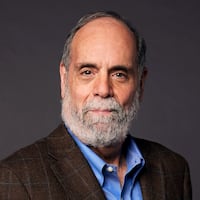A number of political journalists, including The Atlanta Journal-Constitution’s Greg Bluestein, described the second GOP presidential debate in Simi Valley, California, as “chaotic,” while others said it was “frenzied.” Even Florida Gov. Ron DeSantis said in a post-debate interview that “if I was at home watching that, I would have changed the channel.”
So did voters gain any insights from the two hours of slashing attacks by candidates and the rapid-fire changes of topics flung at them by moderators? We asked three of Georgia’s most well respected political science professors to give us their views.
Charles Bullock holds the Richard B. Russell chair in political science at the University of Georgia.
Andra Gillespie is an associate professor of political science and director of the James Weldon Johnson Institute for the Study of Race and Difference at Emory University.
Karen Owen is an associate professor of political science and dean of the honors college at the University of West Georgia.
Q: Was there one clear standout in this debate?
Bullock: I thought (former U.N. Ambassador Nikki) Haley came out best due to her aggressiveness. She also did better at answering questions posed, although none of them would get an A for (1) addressing the question posed or (2) the thoughtfulness of the solutions posed.
Owens: No one candidate emerged as the strong winner. The three front-runners — Ron DeSantis, Nikki Haley and (South Carolina U.S. Sen.) Tim Scott — commanded more attention, addressed several more issues and engaged in a back-and-forth exchange to expose each other and their records. Vivek Ramaswamy demands to be heard and will interrupt and respond to any critique. Scott had a better performance (than in the first debate). DeSantis showed once again he represents the populist wing of the party. Haley showed she is more closely situated with the GOP establishment.
Gillespie: The only interesting thing I learned from this debate was that only Ron DeSantis has a Spanish translation of his website. I don’t expect Nikki Haley’s poll numbers to fade, but she had a stronger debate performance in August than she had last night. In general, though, DeSantis and Tim Scott had a lot riding on last night’s debate, and their performance was fair to middling at best. I doubt that this debate will give them the shot in the arm financially or pollwise that they were looking for.
Q: Was there a clear loser? Did any candidate have a breakaway moment?
Owen: No one separated him or herself from the pack. I wouldn’t classify anyone as a clear loser, but (former Vice President Mike) Pence and (North Dakota) Gov. Doug Bergum didn’t have outstanding performances or connect well with expressing ideas or an energetic vision.
Gillespie: If anyone faded into the background in last night’s debate, I would say that it was Mike Pence. His most notable soundbite came when he assisted Nikki Haley in attacking Vivek Ramaswamy on Ukraine and China. Ramaswamy’s attempt at moderating his tone (if not his rhetoric) and his continued praise for Donald Trump may evince his desire to be a VP candidate if he can’t win.
Bullock: Pence did poorly, especially in light of his many years in government. I was surprised how little substance he offered. That made him the biggest loser, although I didn’t think that Burgum, Scott or Ramaswamy did much to help their causes. Ramaswamy revealed shortcomings of being an amateur with no government experience. Scott did poorly on addressing questions. None of them came to terms with answering questions about the (United Auto Workers) strike. Lot of pivoting with one sentence in response to the question posed before shifting to talk about the border or the shortcomings of Bidenomics.
Q: Did anyone gain ground on Donald Trump?
Gillespie: This is Trump’s race to lose, and everyone on the stage in Simi Valley played a supporting role. With the exception of Chris Christie, the candidates largely missed opportunities to make a clear case that Republican primary voters should vote for them and not Trump. Going forward, I will be paying more attention to fundraising. Someone on that stage may be close to running out of money. It will be finances, not just poll numbers, that ultimately thin out this field.
Bullock: No one did anything that will diminish Trump in the eyes of his loyalists, although there may be movement of a few percentage points in the next polls.
Owen: A candidate’s path to challenging and winning the GOP nomination over Trump at this point seems improbable. DeSantis (needs) to lay out an agenda, vision and plan that challenges Trump yet shows he is someone still in the MAGA/populist lane. Haley and Scott (could be) strong contenders if they can ... grab more potential moderates who lean Republican and may have left the GOP in 2020.
About the Author
Keep Reading
The Latest
Featured




